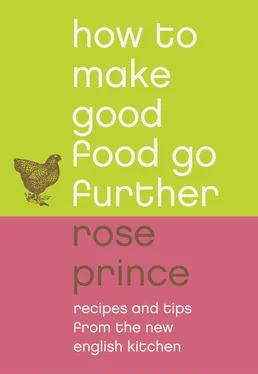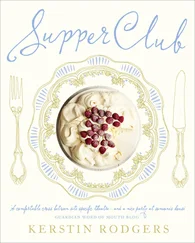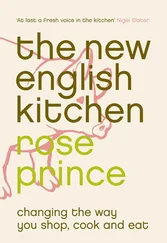How to make good food go further
Recipes and Tips from The New English Kitchen
Rose Prince

Introduction Introduction When you eat a langoustine, it gives you a present of its shell. Take that shell, toast it in a pan with some others, then boil in water – and you have a broth. That broth becomes one to pour over rice noodles with spices … You bought something good for a meal and it gave you two things good. This simple idea not only enables you to eat well – twice – but is also a solution to the contemporary kitchen dilemma: how to make better-quality food something everyone can eat every day. This is possible not only through clever recycling – making, say, roast chicken leftovers into stock and so bringing to the table a second dish of risotto plus a third of smooth vegetable soup – but also by finding economical ways of buying the best, such as buying direct from farms using home delivery, or scouting vegetable stalls for good deals on seasonally abundant vegetables. The New English Kitchen was born of a furious determination to connect the paths of two parallel stories. The first is a happy tale of lovely food, made using good recipes created by television chefs. It has been hard to ignore the cookery boom in all its guises. Up front, the message is all-embracing: consume , and choose what you want; it is all there in the lifestyle pages of the weekend supplements for the taking, cooking and eating. The second story is unsettling. Looking regularly at the daily papers, it is clear that there is something wrong: the food chain is in crisis. Resources have buckled under consumer and retailer pressure to produce cheap food. Unpleasant stories emerge about food-related diseases in livestock and humans; UK farming faces financial ruin, the global market unfair, food is adulterated with chemicals and a growing number of children so unhealthy due to overeating fatty, sugary food that their parents may well outlive them. Rarely does a week pass without headlines reporting more trouble in the food industry. Flick back to the recipe feature in the magazine – and to be quite frank you could be on another planet. Enjoy! Chargrill some more tiger prawns – to hell with the devastating effect warm-water prawn farming has had on the mangrove forests! Teriyaki another chicken breast – never mind where it comes from! But beyond the headlines, there is a fledgling army of farmers, food producers, campaigners and food writers who are giving food and cookery back their integrity. More vital still is the consumer who wants to buy the best in order to eat well every day. This book is for you. It will help your good intentions into practical reality, proving that sustained good eating need not use up all your money and time.
1: Bread
2: Stock
3: Poultry
4: Beef, Pork and Lamb
About the author
By the same author
Copyright
About the Publisher
When you eat a langoustine, it gives you a present of its shell. Take that shell, toast it in a pan with some others, then boil in water – and you have a broth. That broth becomes one to pour over rice noodles with spices … You bought something good for a meal and it gave you two things good.
This simple idea not only enables you to eat well – twice – but is also a solution to the contemporary kitchen dilemma: how to make better-quality food something everyone can eat every day. This is possible not only through clever recycling – making, say, roast chicken leftovers into stock and so bringing to the table a second dish of risotto plus a third of smooth vegetable soup – but also by finding economical ways of buying the best, such as buying direct from farms using home delivery, or scouting vegetable stalls for good deals on seasonally abundant vegetables.
The New English Kitchen was born of a furious determination to connect the paths of two parallel stories. The first is a happy tale of lovely food, made using good recipes created by television chefs. It has been hard to ignore the cookery boom in all its guises. Up front, the message is all-embracing: consume , and choose what you want; it is all there in the lifestyle pages of the weekend supplements for the taking, cooking and eating.
The second story is unsettling. Looking regularly at the daily papers, it is clear that there is something wrong: the food chain is in crisis. Resources have buckled under consumer and retailer pressure to produce cheap food. Unpleasant stories emerge about food-related diseases in livestock and humans; UK farming faces financial ruin, the global market unfair, food is adulterated with chemicals and a growing number of children so unhealthy due to overeating fatty, sugary food that their parents may well outlive them. Rarely does a week pass without headlines reporting more trouble in the food industry.
Flick back to the recipe feature in the magazine – and to be quite frank you could be on another planet. Enjoy! Chargrill some more tiger prawns – to hell with the devastating effect warm-water prawn farming has had on the mangrove forests! Teriyaki another chicken breast – never mind where it comes from!
But beyond the headlines, there is a fledgling army of farmers, food producers, campaigners and food writers who are giving food and cookery back their integrity. More vital still is the consumer who wants to buy the best in order to eat well every day. This book is for you. It will help your good intentions into practical reality, proving that sustained good eating need not use up all your money and time.
Конец ознакомительного фрагмента.
Текст предоставлен ООО «ЛитРес».
Прочитайте эту книгу целиком, купив полную легальную версию на ЛитРес.
Безопасно оплатить книгу можно банковской картой Visa, MasterCard, Maestro, со счета мобильного телефона, с платежного терминала, в салоне МТС или Связной, через PayPal, WebMoney, Яндекс.Деньги, QIWI Кошелек, бонусными картами или другим удобным Вам способом.













